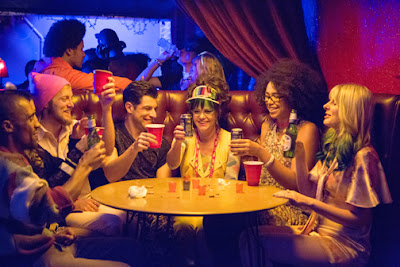This is a nice surprise.
Although director Kyle Marvin’s cheerful romp is the silly little comedy one would expect from its premise and publicity, it’s also a delightful showcase for its Hollywood veterans.
 |
| Four rabid football fans "of a certain age" — from left, Trish (Jane Fonda), Betty (Sally Field), Lou (Lily Tomlin) and Maura (Rita Moreno) — can't believe they've actually made it to the Super Bowl. |
Add the fact that these events are set against the historic Super Bowl LI, and the result is a “silly comedy” that builds to an exhilarating climax.
The setting is Massachusetts in 2017, where longtime friends Lou (Lily Tomlin), Trish (Jane Fonda), Maura (Rita Moreno) and Betty (Sally Field) gather in front of the TV every game day to don team jerseys and watch their beloved Patriots … and, most particularly, quarterback Tom Brady.
This routine has continued for years, ever since getting involved with football helped Lou defeat a bout with cancer. In a nod to sports voodoo — as with baseball players who never change their socks once a streak is established — these four gals diligently mimic their actions prior to a long-ago upset victory: where they were sitting or standing, and what they were saying and doing, down to spilling a bowl of potato chips at a precise moment.
Lou is the gutsy ringleader, who insists on the replication of all these details. Trish is glam and feisty; Maura is adventurous and tireless. Betty is smart and down-to-earth: the gang’s pragmatic conscience.
Each woman comes with a bit of emotional baggage. Maura hasn’t recovered from the loss of her husband, and — rather than live alone in their home — she has sorta-kinda moved into an assisted living facility, in order to be surrounded by other people.
Trish falls in love too quickly, and repeatedly gets her heart broken; Lou constantly worries that her cancer might recur. The precise and practical Betty, although a whiz with math and stats, can’t figure out what to do with her hapless husband (Bob Balaban, as Mark), whose absent-mindedness has become a trial.
Once the game concludes, on this particular afternoon, Lou impulsively decides that they all should attend the upcoming Super Bowl, at Houston’s NRG Stadium.
But that’s an impossible proposition. They all live (albeit comfortably) on fixed incomes; obtaining tickets is prohibitively expensive, to say nothing of travel and lodging.



